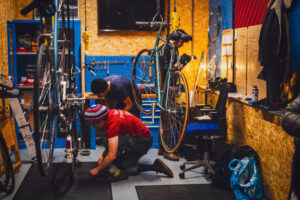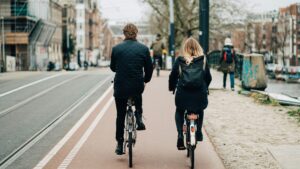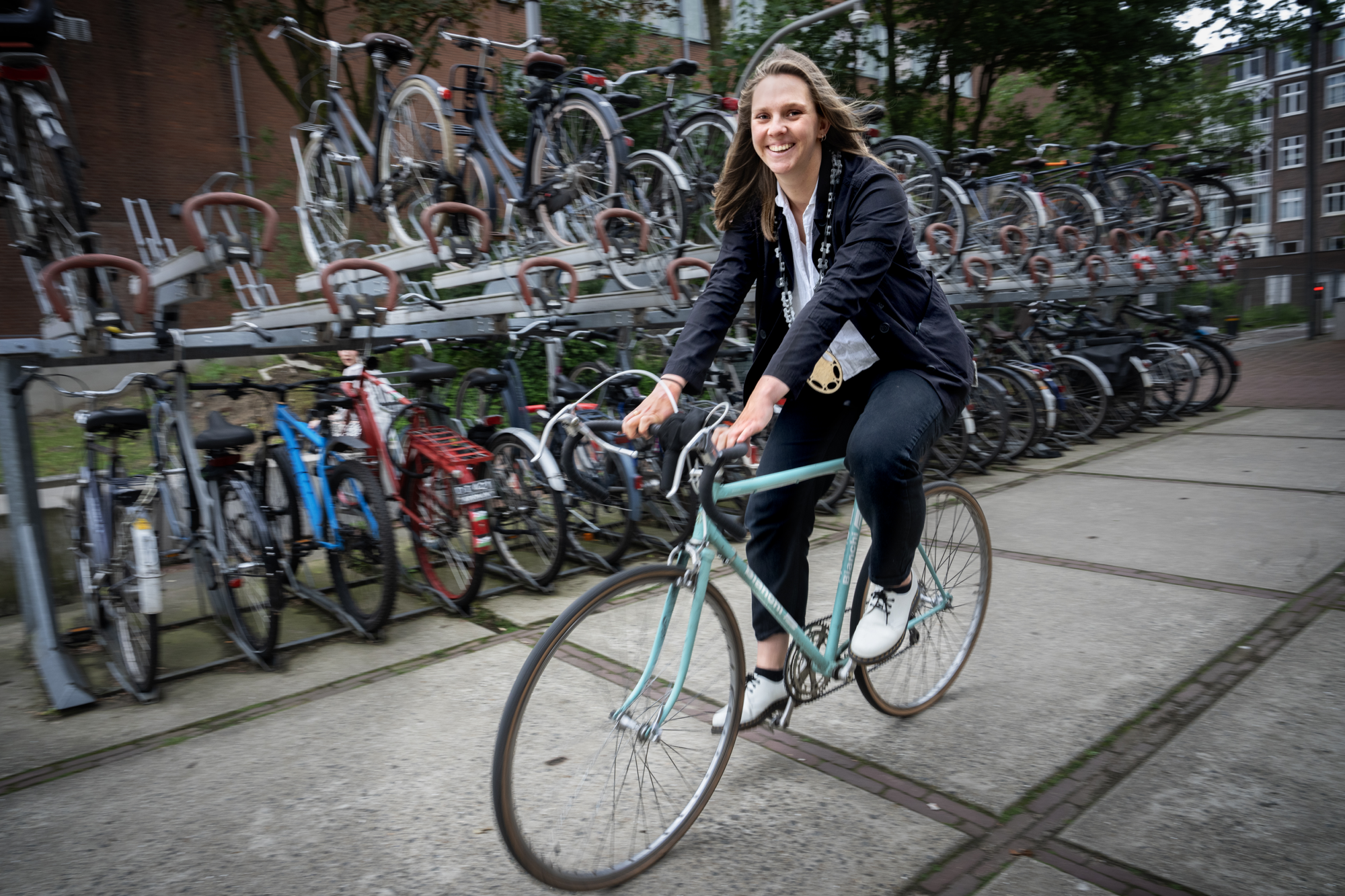A Mayor for the Future
In March 2024, 25-year-old Romee Nicolai was appointed Bicycle Mayor for the City of Amsterdam. Over the next two to four years, she aims to bring the ‘slow city’ concept to the Dutch capital and build a stronger sense of community among local residents, one bike at a time.
An interview with Romee Nicolai, elaborated by Quaid Cey.
In a country where citizens cycle an average of 18.8 kilometres per week, strong cycling policies are a must. Thankfully, the City of Amsterdam is ahead of the game: safe roads, well-maintained bike lanes, and ample parking spaces are just a few of the ways that the Dutch capital is encouraging its citizens to make short-distance trips by bike.
Confronted with a shortage of public space and the looming climate crisis, Amsterdam has made ‘conscious mobility behaviour’ one of its top future transport priorities. In practice, this means promoting travel modes that occupy as little space as possible and produce the smallest carbon footprint. Few will be surprised to hear that cycling is one of the main ingredients of the city’s ‘conscious mobility’ mix.

Kick Smeets
But earlier this year, Amsterdam took things one step further: in March, the city appointed 25-year-old Romee Nicolai as its newest Bicycle Mayor. Alongside her ongoing Master of Urban and Regional Planning at the University of Amsterdam (UvA), Nicolai will work with city officials and the international BYCS Network of Bicycle Mayors to enhance Amsterdam’s cycling policy. If that weren’t enough, she will also continue to serve as Project Leader for the Bike Kitchen UvA, a community space where visitors can learn about bike repair.
Eager to know more, POLIS reached out to Nicolai to find out what plans she has for the next two to four years of her term. Drawing on a life-long love of cycling and a more recently discovered passion for bike repair, she shared insights into Amsterdam’s bike culture, explained why human connection is essential to sustainable cycling behaviour, and told us what she thinks the ‘slow city’ concept means for Amsterdam’s future.
POLIS: Being elected Bicycle Mayor for the City of Amsterdam at the age of 25 is quite an achievement. Now that the time has come for you to make your mark, what do you aim to achieve in the next two years?
Romee Nicolai: I feel honoured to fulfil this role as Bicycle Mayor because it feels like an extension of my values and the goals that I want to achieve to make a city like Amsterdam safer and more bike-friendly.
A bicycle mayor is a connector: between people, the city, and bicycles. This can be done by highlighting the benefits of cycling in terms of economy, sustainability, and health. Furthermore, it can be done by exploring the opportunities for collaboration between like-minded businesses, government institution programs, and community groups, to lay the groundwork for a movement of stakeholders that share the same ideas.
During my term as Bicycle Mayor of Amsterdam, I aim to stimulate debate about the meaning of cycling. Additionally, I hope to enhance the human-city-bike connection through self-repair facilities and activities in the city that reshape people's beliefs about cycling.
POLIS: As the new Bicycle Mayor of Amsterdam, you have also joined the BYCS network, which includes more than 200 bicycle mayors worldwide. What do you hope to gain from your participation in this network? What lessons might bicycle mayors from cities across Europe and further afield have to offer Amsterdam?
Romee Nicolai: I am part of an international network of 144 bicycle mayors worldwide: 60 from Europe, the Middle East, and North America, 55 from India, and 29 from Latin America. The role of a bicycle mayor depends on the individual and their background, but it primarily involves representing the interests of cyclists in one’s city. It inspires me to see that we all have a common ground and aspire to explore ways to make cycling more accessible and cities more bike-friendly for every group in society.
This made me reflect on the fact that we are spoiled with our Dutch infrastructure and bike facilities, but that accessibility and road safety are still topics for improvement. In Amsterdam, the primary challenge is not how to convince car-owners to switch to bikes, but more to convince bike-users not to behave like car-users with their speed and reckless behaviour.
My goal is to create awareness and dive into the above-mentioned themes by
introducing new social norms around cycling. The most powerful way to do this is
learning by doing.
POLIS: Alongside your mayoral duties, you are also enrolled in the Master of Urban and Regional Planning at the UvA. How do these two roles feed into each other? In other words, how do your studies inform your work as Bicycle Mayor, and vice versa?
Romee Nicolai: That is right. My bachelor's and master's studies at the UvA have both been in the field of social science, so I have an academic background in the field that I am currently working in. In social science, you investigate from an interdisciplinary perspective how decisions in the physical environment can have an impact on the social beliefs and behaviour of people and vice versa. This is exactly what a bicycle mayor does as well.
My study background helps to create a solid knowledge and value base for decision-taking: I have the academic and societal know-how to understand what (side)effects of different mobility-related decisions could have on human well-being and the opportunities for interaction. While it was ambitious and challenging to combine my studies with work, it was possible thanks to my internal drive and persistency to make knowledge more tangible and to transform societies through individual action.
POLIS: Amsterdam is often seen as a haven for cyclists, but you have pointed out that the city's cycling culture lacks an element of ‘human connection.’ Can you elaborate on this? Moreover, how is this observation linked to your mission at the Bike Kitchen UvA?
Romee Nicolai: Bike-friendly means that the opportunity for bikes is well-provided in Amsterdam. This is true: We have bike lanes everywhere, a lot of (underground) bike parking facilities, well-known Dutch cycling brands, and good-quality bikes.
However, from what I experienced as a born-and-raised Amsterdammer is that the pace of life is based on time: everyone seems to be in a hurry, and everything is based on efficiency. Furthermore, Amsterdam is a fast-growing city and is becoming more crowded.

Inside the Bike Kitchen UvA
Romee Nicolai
Therefore, it concerns me that people appear to not have time for each other: greeting each other while passing, taking each other into account on the road, or creating a moment of interaction while waiting for a traffic light. It sometimes feels that everyone in traffic seems to be bothered by the time that their journey takes in their daily lives.
This is one of the reasons I started the Bike Kitchen UvA: a do-it-yourself bike repair workshop, where it’s all about the journey and repairing by trial and error. It is located on a university campus with over 26,000 students and is known internationally as a testbed for innovative research in different disciplines and themes such as sustainability. As a student, I realised that everyone became almost invisible in the masses and that there was a need for cocreation, interaction, and knowledge exchange.
Therefore, I thought: What is something that everyone has and that can create engagement? Bicycles. My goal is to create awareness about the fact that a bike can be more than only a transport mode; it is also a means of self-expression, freedom, and social interaction. In the bike kitchen, we offer a DIY repair space, but what we actually do is create a living lab and social hub in which different types of knowledge emerge. This started very grassroots- and bottom-up but has proven successful already and has been fully booked since it opened.
POLIS: In a past interview, you said that you are a proponent of the ‘slow city’ concept and that you hope for Amsterdam to embody this ethos in its cycling policy. In your opinion, how could the slow city concept benefit transport policy in Amsterdam?
Romee Nicolai: I strongly believe that the concept of the slow city allows for the improvement of life quality because slowing transport has benefits for the health of people, the planet, and the economy. This helps to create a more human-centred instead of a transport/product-centred approach in policymaking.
As Jane Jacobs already stated in the 60s, cities should be seen as dynamic, living ecosystems that change over space and time. If transport planning continues to take this aspect into account in decisionmaking, citizens become the protagonists and mobility is a means to help them move around.
In Amsterdam, the slow city could highlight a more human-oriented approach and accentuate diversity. This provides a counterbalance to the acceleration of society and the conventional goal-oriented approach, in which it seems that there is no space for reflection.
POLIS: If biking is to become a regular feature of daily life and a pillar of sustainable mobility in communities around the world, what do you think must change? What role can bicycle mayors such as yourself play in driving this change?

Making space for cyclists (Amsterdam)
Guus Baggermans, Unsplash
Romee Nicolai: To begin with, we need to address what is needed to enhance the accessibility of biking worldwide. In saying this, I am aware that I speak from a Western/Global Northern perspective.
Mobility justice is an important aspect to consider here. What must be changed is situation- and location-dependent but can refer to several common characteristics such as good bike infrastructure and facilities, awareness and education about the use and risks of cycling, and access to bikes.
In addressing these points, bicycle mayors could have a role in stimulating debate and supporting initiatives such as cycling lessons for children, ride-outs for local communities, publication of new research about the impact of cycling on citizens’ health and personal development, etc.
The fun thing about being a bicycle mayor is that you can give it your personal touch and fill it in with the themes that you believe in. In this way, you help to form communities that share the same mindset. I think that this is a very powerful way to create change.
Click here to read the article in its original format.
About the contributors:
Interviewee: Romee Nicolai is Amsterdam’s Bicycle Mayor, the leader of the Bike Kitchen at the University of Amsterdam (UvA), and a student of the UvA Master in Urban Regional Planning. In 2023, she was nominated UvA Talent and UvA Impactmaker. In 2024, she will speak at the VeloCity and EuroBike conferences. Through her work, she aims to strengthen the human-mobility relationship and stimulate transdisciplinary learning.
Interviewer: Quaid Cey: As part of the communications team, Quaid produced news and social media content, promoted POLIS events and campaigns, and contributed to the publication of Cities in motion. He has a BA in Liberal Arts & Sciences from the University of Maastricht (UM) and an MA in Communication Studies from the Vrije Universiteit Brussel (VUB).
 Kick Smeets
Kick Smeets